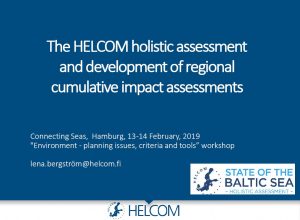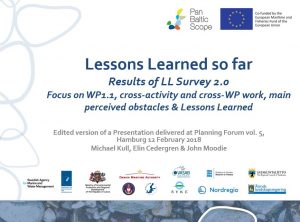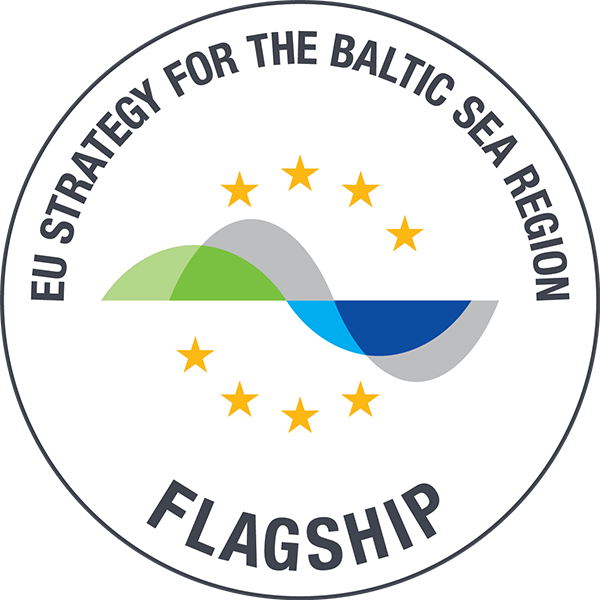The Planning Forum being the main hub of this project and a platform for collaboration on planning issues had its 5th meeting on 12 February in Hamburg. Along the issues related to the progress of the project informing on each countries’ most pressing issues and developments in each activity the particular attention was paid to the following topics:
- Cumulative Impacts
- Lessons Learned
- Cross border fisheries
CUMULATIVE IMPACTS
One basis for addressing cumulative impacts can be found in the recently finalized State of the Baltic Sea report. The report:
- gives a summary of the environmental state of the Baltic Sea during 2011–2016.
- shows that renewed efforts for the Baltic Sea environment are strongly needed
- makes it possible to compare the status of different pressures on the environment and identify areas where they mainly occur
In this context, the work in Pan Baltic Scope will:
- develop Baltic regional approaches to address cumulative impacts when doing MSP
- increase coherence in methods and data used among countries
- connect to the status assessments as carried for the MSFD and the Baltic Sea Action Plan
Working on the project forces us to think about the tasks that await us in our countries in a few years
LESSONS LEARNED
Main takeaways:
- Pan Baltic Scope contributes well to the set main aims and objectives: Exchange Information, Increased learning, Identify Cross-border Issues
- To be improved: Increased alignment of National Plans and Enhanced cooperation between planning authorities and sectoral actors
- Better understanding of national MSP processes; work on definitions and concepts is promising and well under way
- Stakeholder work some headache
- Working across Work Packages and activities works well BUT a number of challenges were pointed at
- Main challenges: time and resource use; many dishes and enough cooks?
- Main Lessons Learned: Good collaborative environment – Group Learning; Individual Learning; United in diversity – uniting diversity;
- Main Lessons Learned also: future MSP in Baltic Sea Region looks promising and Pan Baltic Scope contributes to lasting mechanisms
Next Steps:
- Web article about the Lessons Learned in progress (March / April 2019)
- Lessons Learned Focus Group Interview
- Draft Lessons Learned report presentation at Planning Forum / September 2019
- Final Lessons Learned Report published in November 2019
Building trust is a key objective for cross-border MSP
CROSS BORDER FISHERIES
Workshop: Fisheries in MSP – from a national and cross border perspective
The aim of the discussion was to look at how countries around the Baltic sea deal with fisheries in national maritime spatial plans. Three main aspects related to fisheries were considered – data, stakeholders and solutions. The discussion was moderated by Latvian Ministry of Environmental Protection and Regional Development, hence informative part was opened with the experience from Latvia and followed by presentations from Finland, Åland, Sweden, Denmark and Poland.
Presentations:
Planners discussed some crucial issues:
- How planners are dealing with fisheries in national MSPs in relation to other activities – how prioritisation of uses is handled.
- How planners are dealing with fisheries in cross border context – getting to know, understanding, showing and considering interests of own and other country’s fishermen fishing in other country’s EEZ. And again, how prioritisation of uses is handled.
Conclusions and lessons learned
(1) About open sea fisheries:
Most likely no specific zoning is expected in MSPs across Baltic sea for fisheries as well as no planning for fisheries, but what is important – to have best possible data on:
- Fish stock important areas – here results from Essential Fish Habitats activity (as part of work on the Green Infrastructure concept proposal) should bring much value and should be considered in national MSPs.
- It’s important to acknowledge cross border interests – fishermen fishing in other country’s EZZ.
(2) For the coastal fisheries very important issue is a relation of coastal fisheries and coastal culture/economy (communities, settlements and lifestyles). Especially for countries where MSP covers all waters and local municipalities communities need to display their interests in plans (e.g. Latvia).
Fisheries in general:
- Fisheries still take a substantial part in economies.
- Among fishermen, experts and planners still big issue is communication and awareness built on trust and knowledge, what eventually is crucial for agreements and decision making for the future.
Communication is key! Discuss issues / give positive feedback.
Trust each other / delegate tasks when you need to












